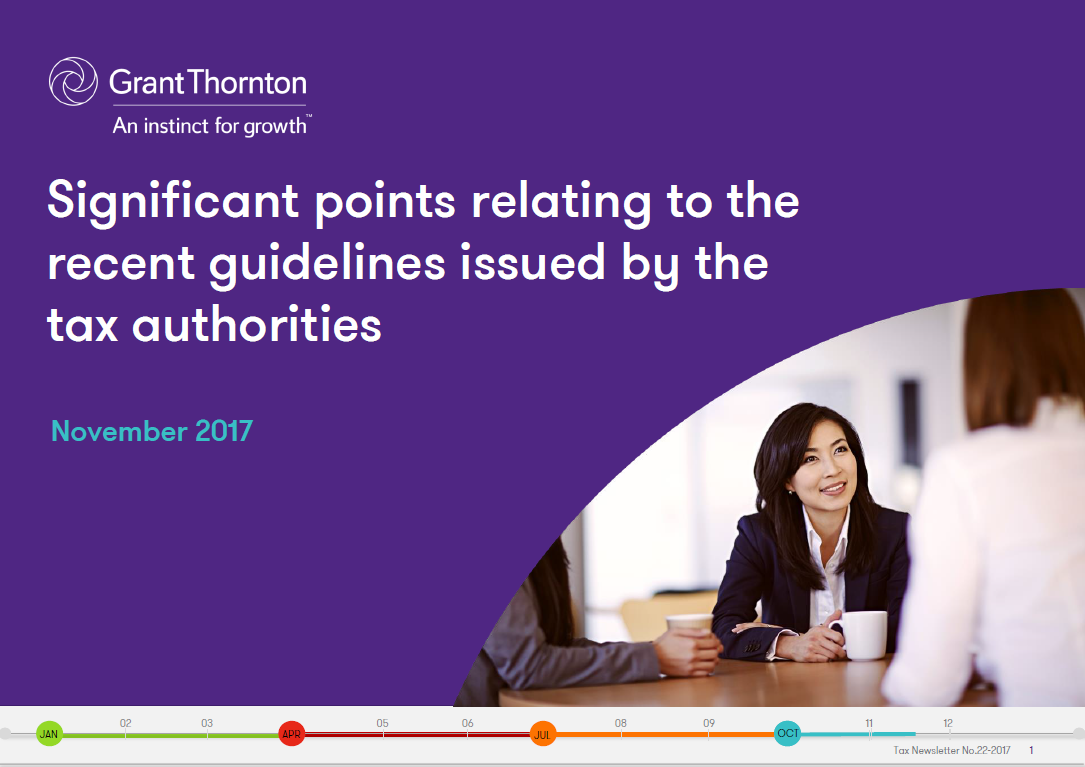-
International Financial Reporting Advisory Services
IFRS reporting advisory serivces of Grant Thornton are carried out by our dedicated team with expertise in IFRS implementation.
-
Audit Services
• Statutory audit • Review of financial statements and financial information • Agreed-upon procedures • FRAS services • Compilation of financial information • Reporting accountant • Cross-border audit • US GAAP audit
-
Audit Quality
We have various methods of monitoring our system of quality control and engagement quality, including real-time involvement of coaches and national office personnel on select audit engagements, reviews of issuer audit engagements prior to archiving by someone outside of the engagement team, and internal inspections of assurance engagements and the system of quality control.
-
Audit Approach
Audit Approach
-
Licensing services
Licensing services
-
International tax planning
Our extensive international network provides us with significant resources to meet all your expansion goals. We strive to develop commercially focused and tailored tax strategies to minimise tax exposures and maximise business efficiency.
-
Expatriate tax planning
We have a broad knowledge base and skills to assist you keep your personal income taxes to a legitimate and reasonable level, while remaining compliant with legislation. We can develop a personalised package for each key employee to take maximum advantage of the exemptions and incentives available.
-
Tax advisory
We will review the proposed business model and transactions and advise on tax implications and recommendations to optimize the tax opportunities under the local regulations and treaties which Vietnam entered into. Furthermore, we coordinate with our GT global tax team to provide a comprehensive tax advisory for the countries involved in the business model and transactions.
-
Tax compliance services
This service is designed to assist enterprises to cope with the statutory tax declaration requirements in line with the Vietnamese tax laws as well as the frequent changes and updates in tax laws.
-
Tax health check
Our Tax Health Check involves a high-level review of specific tax areas to highlight the key issues that need to be rectified in order to reduce tax risks. Through our extensive experience, we have identified key risk areas in which many enterprises are not fully compliant or often overlook potential tax planning opportunities. Our tax health check service represents a cost-effective method to proactively manage risks and reduce potential issues arising as a result of a tax inspection.
-
Transfer Pricing
Transfer pricing is a pervasive tax issue among multinational companies. In Vietnam, the tax authorities require special documentation to report related party transactions. Compliance with transfer pricing regulations is an important aspect of doing business effectively in Vietnam as failure to do so may result in significant penalties.
-
Tax due diligence
We conduct tax due diligence reviews of target companies to analyse their tax exposure and position in relation to acquisitions, mergers or consolidations. We are able to integrate this service with our Advisory Services department in order to offer a comprehensive, holistic due diligence review.
-
Customs and international trade
Our experienced professionals can help you manage customs issues more effectively through valuation planning and making use of available free trade agreements. We also assist Clients in optimising their customs procedures by making use of potential duty exemptions and efficient import-export structures. Risk mitigation activities include customs audit defense and compliance reviews.
-
M&A Transaction
We advise numerous foreign investors on efficient tax structures for their investments. Our experience allows you to consider all the options and set up a corporate structure that meets both operational and tax efficiency requirements. In short, the structure that is best for you.
-
Industrial Zones – Picking A Location For Your Business
Grant Thornton Vietnam’s one-stop services are designed to provide comprehensive support to both new and current investors who are planning to expand or restructure their business in Vietnam. Our professionals have established strong working relationships with landlords, property developers and authorities at various localities. With extensive experiences in liaison with the relevant agencies, we offer assistance including negotiation on land rental rates and efficient management of licensing process. Our customized and flexible solutions can bring benefits of cost efficient location, accelerate licensing process, and optimize tax opportunities while remaining in compliance with legislation.
-
Tax Audit Support
Tax audit support services provide comprehensive assistance to your business in Vietnam. Recent tax practices have shown the general tendency of launching routine tax audit on yearly basis. Tax authorities have been effectively using more sophisticated methods to identify target entities from across different industry sectors.
-
Business Risk Services
Business Risk Services
-
Transaction Advisory Services
Transaction Advisory Services
-
Valuation
Valuation
-
Business consulting services
Finance Management Advisory
-
Accounting services
Accounting services
-
Taxes compliance within outsourcing
Taxes compliance within outsourcing
-
Payroll, personal income tax and labor compliance
Payroll, personal income tax and labor compliance
-
Secondments/Loan staff services
Secondments/Loan staff services
-
Compilation of the financial and non-financial information
Compilation of the financial and non-financial information
-
Accounting systems review and improvement
Accounting systems review and improvement
-
Initial setting-up for accounting and taxes systems
Initial setting-up for accounting and taxes systems
-
Management accounting and analysis
Management accounting and analysis
-
Comprehensive ERP system solution
ERP software is a tool for business operations, production management, order processing and inventory in the business process. Today, ERP software for small and medium businesses has been greatly improved to help businesses manage their business better. The article below will answer all relevant information about what ERP software is and offer the most suitable ERP solution for businesses. Let's follow along!
-
Analyze Business Administration data
We believe in the value that data can bring to the success and development of every business. Our team helps design data architecture supported by tools, to support business governance and provide useful information to management.
-
Financial reporting compliance solution package
Putting financial issues at the heart, this service helps ensure that financial reports for customers comply with both the requirements of Vietnamese accounting regulations and standards (VAS) as well as reporting standards. international finance (IFRS).
-
Third-party ERP extensions
ERP is a long-term solution that requires long-term travel, not short-term. We understand that many businesses cannot deploy the entire ERP system at once due to many different reasons, instead businesses can deploy each part. Over time, these solutions can be expanded to accommodate improved business processes or can even link completely new processes across different departments.
-
Localize, deploy and rebuild the project
Quite a few ERP projects need to be implemented according to current Vietnamese requirements and regulations, but still comply with common international business requirements. These projects need some improvements and adjustments in the right direction.
-
Consulting on technology solutions
We support the selection and implementation of the most suitable solutions, ensuring business efficiency and performance. We will work closely with customers to plan, evaluate and implement the right technology investment strategies and solutions to meet the development needs of businesses.

-
Offshore company establishment service
Using the offshore company model will facilitate the owner in the process of transaction and expand overseas markets, take advantage of the tax policy with many incentives and protect the value of the family enterprise's assets.
-
Private Trust Advisory
The development of the economy with many modern financial instruments has brought many advantages and opportunities for the enterprises, but there are still certain potential risks in any type of business. So how to protect your asset value with an appropriate company structure while stay compliance with relevant regulations?
-
Our values
We have six CLEARR values that underpin our culture and are embedded in everything we do.
-
Learning & development
At Grant Thornton we believe learning and development opportunities help to unlock your potential for growth, allowing you to be at your best every day. And when you are at your best, we are the best at serving our clients
-
Global talent mobility
One of the biggest attractions of a career with Grant Thornton is the opportunity to work on cross-border projects all over the world.
-
Diversity
Diversity helps us meet the demands of a changing world. We value the fact that our people come from all walks of life and that this diversity of experience and perspective makes our organisation stronger as a result.
-
Contact us
Contact us
-
Available positions
Experienced hires
-
Available positions
Available positions
1. Official Letter No. 65143/CT-TTHT dated 02 October 2017 issued by Hanoi Tax Department in response to the Japanese Business Association in Vietnam’s queries about tax policy
On 02 October 2017, Hanoi Tax Department issued Official Letter No. 65143/CT-TTHT to reply to the queries of enterprises who are members of Japanese Business Association in Viet Nam (JBAV). The Official Letter includes the following noteworthy points:
- Tax treatment on the expense corresponding to Personal Income Tax (“PIT”) compliance services paid by an enterprise for their expatriate staff:
For Corporate Income Tax (“CIT”), the expense is deductible given that it satisfies the conditions indicated at Point 1, Article 4, Circular 96/2015/TT-BTC and is specifically mentioned in the written contract or agreement between the enterprise and the employee.
For Personal Income Tax (“PIT”), the expense is treated as taxable income of the expatriate and subject to PIT.
- A company in Vietnam has an expatriate, who is a tax resident in Vietnam. Upon his termination of assignment in Vietnam, according to the parent company’s global mobility, he submitted his PIT finalisation return, fulfilled his PIT obligation in Vietnam and then returns to his home country. Afterwards, the company in Vietnam pays the expatriate a bonus corresponding to his working period in Vietnam upon its parent company’s request. Accordingly, such bonus (which is paid by the company after the expatriate returns to his hometown) is subject to PIT at the flat tax rate of 20% applicable to tax non-residents, in Vietnam. The company in Vietnam is responsible for withholding PIT imposed on such income before making payment.
- It is re-affirmed that Export Processing Enterprises (“EPEs”) are allowed to sell their products into the domestic market according to Point 5, Article 1, Decree 114/2015/ND-CP amending and supplementing Article 21, Decree 29/2008/ND-CP on industrial parks, export processing zones and economic zones.
2. Tax treatment on refuse, scrap, redundant raw materials and supplies imported for processing in Vietnam
Currently, many companies have difficulties in applying regulations on refuse related to imported materials, scrap, redundant raw materials and supplies for processing purposes, in Vietnam due to different points between Decree No. 134/2016/ND-CP (“Decree 134”) and Circular No. 38/2015/T-BTC (“Circular 38”).
In particular, Point 4, Article 10, Decree No. 134/2016/ND-CP stipulated: "Refuse, scrap, redundant raw materials and supplies imported for processing under a processing contract shall be exempt from import duties when they are sold domestically provided that they do not exceed 3% of the quantity of each type. However, Value Added Tax, Special Sales Tax and Environment Protection Tax (if any) shall be paid to the customs authority”.
On the other hand, Point 5, Article 64, Circular No. 38/2015/TT-BTC regulated: "If the amount of redundant raw materials and supplies imported for processing do not exceed 3% of the total amount of materials and supplies imported, the customs procedures relating to the change in use purpose are not required, when these redundant materials and supplies are sold in the domestic market. However, tax liabilities must be declared and paid to the tax authorities in accordance with tax provisions".
The first difference is that Decree 134 had regulations on refuse, scrap, redundant raw materials and supplies whereas Circular 38 only mentioned redundant raw materials and supplies. Additionally, the rate of 3% applied to refuse and scrap is not reasonable, in practice, according to the opinions of enterprises as for certain types of imported goods and raw materials, the rate of refuse and scrap when initially imported is higher than 3%.
Another difference is that the tax declaration and payment must be made to the customs authorities in compliance with Decree 134 whilst those must be paid to the tax authorities under Circular 38.
In this regard, on 02 November 2017, the General Department of Customs issued Official Letter No. 7166/TCHQ-TXNK to have a uniform treatment on refuse, scrap, redundant raw materials and supplies imported for processing purpose to comply with Decree 134/2016/ND-CP.
Also, the General Department of Customs has requested the Ministry of Finance to collect opinions from other relevant Ministries and Authorities. Then, based on the result of the opinions collected, the General Department of Customs will submit a proposal to the Ministry of Finance, so that the Government can consider amending and supplementing the regulations appropriately.
3. Determination of tax residency status of Vietnamese individuals assigned to work overseas
The General Department of Taxation has recently issued Official Letter No. 4936/TCT-TNCN dated 25 October 2017 providing guidelines on determining tax residency status of Vietnamese individuals who are assigned to work/ attend training in Japan. Accordingly, an individual who has permanent residence in Vietnam but is physically present in Vietnam less than 183 days in the tax year will determine his residency status in Vietnam as below:
- In case an individual is a tax resident in Japan, under Japanese regulations he will be considered a tax non-resident in Vietnam. Consequently, PIT withheld from his Vietnam-sourced income under the progressive tax rates shall be re-calculated at the flat tax rate applied to tax non-residents.
- In case an individual is a tax non-resident under Japanese regulations, he will be treated as a Vietnamese tax-resident and his worldwide income will be subject to PIT under the progressive tax rates.
Please contact our professional advisors at Grant Thornton Vietnam for assistance with taxation, work permits for expatriate and legal issues you may have during the course of your business.






